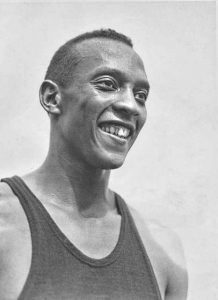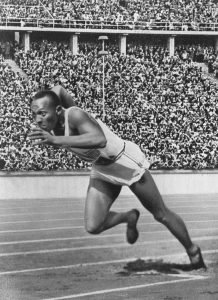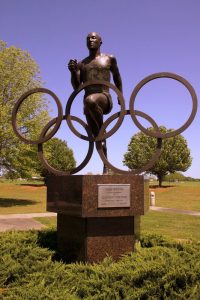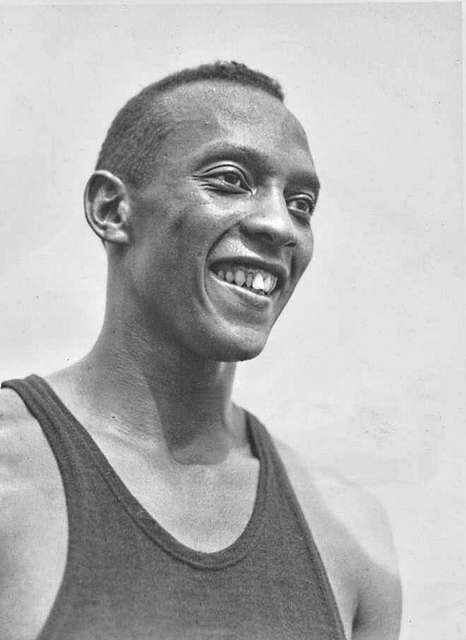Jesse Owens Olympics career is one of the most characteristic in the history of track and field. Not only did Jesse Owens win multiple gold medals in Track and Field, but he also won all of them in 1936’s Berlin Olympic Games that were held in Nazi Germany!
In today’s article, we’ll celebrate the life and legacy of one true Olympic champion that stood against racism and poverty. Let’s dive right in!
A Quick Look at Jesse Owens Early Life
James Cleavland “J.C” Owens was born on September 12, 1913 in Oakville, Alabama. Jesse was the youngest of his 7 brothers and 3 sisters.
He was born to a sharecropper father but like many African American families in that time, his family then moved to Cleveland, Ohio looking for a better life. His father and older brothers worked in a steel mill.
By that time, Jesse was 9 years old and enrolled in a school where his teacher misheard “J.C” as “Jesse”, which is where he got his name.
It was also in Fairmont Junior High School in Cleveland, that Owens met Minnie Ruth Solomon, who would later become his wife from 1935 to his death in 1980.
Jesse worked many simple jobs to help in supporting his family. As a youngster, he worked as a groceries delivery boy and freight car loader, and even as a worker in a shoe repair shop.
Who Were Jesse Owens’ Idols and Aspirations?
Jesse Owens has always mentioned one of his teachers in Fairmount High School as his major inspiration. Not only that, but he also attributed all his athletic triumph to him, saying that if it wasn’t for his encouragement, Owens wouldn’t have pursued an athletic career.
The name is Charles Riley, and he was Owens’ track coach during his time at Fairmont Junior High School in Alabama.
As previously mentioned, Owens had to take several jobs after when he was young, whether it was in summer or after school. During his time in junior high school, Owens used to work in a shoe repair shop.
Mr. Riley didn’t only encourage Jesse Owens to take his athletic career seriously, but he also let him practice before school so that he can keep working in the shoe repair shop after school. Jesse Owens even tributed Mr. Riley in his autobiography:
“Every morning, just like in Alabama, I got up with the sun, ate my breakfast even before my mother and sisters and brothers, and went to school, winter, spring, and fall alike to run and jump and bend my body this way and that for Mr. Charles Riley.”
When Did Jesse Owens’ Athletic Career Begin?

Jesse Owens started showing his promise in athletics from a young age, which is why his track coach in junior high school encouraged him to train harder.
When Jesse joined the East Technical High School, he participated in sporting competitions, such as National High School Championships.
During that competition in 1933, he equaled the world record for the 100 yards dash of 9.4 seconds and managed to long jump 24 feet 9 1/2 inches.
Did Jesse Owens Go to College?
Jesse Owens went to Ohio State University and was coached by Larry Snyder during that time. Owens was then known as the “Buckeye Bullet”, thanks to his incredible speed at sprinting.
In the NCAA championships, Owens managed to win 4 individual medals in 1935. In less than 45 minutes, Jesse Owens managed to achieve all the following:
- Equalling the world record for the 100-yard dash (9.4 seconds)
- Setting a new world record in the long jump (26 feet 8 1/4 inches), a record that stood for a quarter of a century!
- Setting a new world record in the 220 yards sprint (20.3 seconds)
- Break the world record for the fastest 220 yards low hurdles (22.6 seconds)
Not only that, but he also managed to win another 4 individual NCAA championships in 1936. One thing you should know is that despite all his efforts, Owens didn’t receive a college scholarship due to segregation.
Instead, he had to continue working part time jobs in order to pay for college, keeping in mind that his father was also employed during that time.
Jesse Owens 1936 Olympics Record

In 1936, Jesse Owens traveled to Nazi Germany in order to compete in Berlin Olympics, despite several trials to persuade him not to participate due to the political tension during that time.
During the competition, the founder of Adidas reached Owens and managed to sponsor him by wearing Gebrüder Dassler Schuhfabrik shoes, making Owens the first male African American to earn sponsorship.
Owens managed to win 4 gold medals during the 1936’s Olympic games, crushing the following competitions:
- The 100 meter dash in 10.3 seconds
- The long jump with a leap of 26 feet and 5 inches, which is slower than his world record by only 3 1/4 inches
- The 200 meter sprint in 20.7 seconds
- The 4 × 100 meter sprint relay in 39.8 seconds, setting a new world record
Owens’ record of 4 gold medals in these competitions stood still for about 48 years until Carl Lewis managed to break it in 1984 in the United States Summer Olympic Games in Los Angeles.
Who Was Jesse Owens Biggest Athletic Rival?
Although Jesse Owens used to have many rivals during his athletic and Olympic career, one of his most notable competitors was Eulace Peacock.
In addition to competing against Jesse Owens on many occasions, surprisingly, both Peacock and Owens grew up in Alabama.
The two started their rivalry early on during a high school sprinting competition. On one day, Peacock set a new record across national schools in the long jump.
However, on the same day, Owens broke the world record for long jumps in Cleveland. He even joked about that moment in one of his interviews saying “I had that record for two hours.”
The two met in person for the first time ever in 1934 at the AAU Indoor championships. Owens even lost to Peacock many times, especially in sprinting, and he was even quoted many times saying that Peacock is the better sprinter between them.
“It’s going to take a special man to beat Eulace Peacock. You see, I’ve already reached my peak. Peacock is just now reaching his. He’s a real athlete. I don’t know whether I can defeat him again.” – Jesse Owens
Jesse Owens’ Struggle with Racism
Although it was typical for the U.S presidents to meet and congratulate the winners the of Olympic games, President Franklin D. Roosevelt didn’t do the same with Jesse Owens. He even reflected on his struggle with racism in his autobiography, where he wrote:
“When I came back to my native country, after all the stories about Hitler, I couldn’t ride in the front of the bus,” he said. “I had to go to the back door. I couldn’t live where I wanted. I wasn’t invited to shake hands with Hitler, but I wasn’t invited to the White House to shake hands with the president, either.”
In fact, the first time Jesse Owens was tributed for his triumph in the Olympics was in 1976, when he was awarded the Presidential Medal of Freedom from President Gerald Ford.
Despite suffering from racism in his life, many notable figures paid a tribute to Owens’ efforts after his death. This includes President Jimmy Carter, who previously ignored Owens’ requests to withdraw USA’s boycott to the 1980’s Moscow Olympics, but more about that later.
How Did Jesse Owens Die?
Despite leading a healthy life during most of his competitive career, Jesse Owens ended up becoming a smoker in his early thirties. In fact, Owens used to smoke up to one pack of cigarettes a day for over 3 decades.
By the end of 1979, Jesse Owens was diagnosed with an advanced form of lung cancer that had him hospitalized multiple times throughout his final two years in our world.
Unfortunately, the aggressive form of lung cancer was resistant to all treatments at that time and in 1980, Jesse Owens left our world at the age of 66 due to his disease on the morning of March 31st.
Owens was surrounded by his family and loved ones on that day in Tucson, Arizona, although he was buried in Chicago, Illinois at the Oak Woods Cemetery, where his grave was set in front of the cemetery’s lake with his tombstone reading “Jesse Owens, 1936 Olympic Champion”.
After his death, Jimmy Carter acknowledged the efforts of Jesse Owens to compete in such a politically charged environment prior to world war II.
During the speech, he was quoted saying “Perhaps no athlete better symbolized the human struggle against tyranny, poverty and racial bigotry.”
Jesse Owen’s Most Memorable Quotes

What’s a better way to see the world from the eyes of such an iconic track and field champion than having a quick look at some of his most popular quotes?
Whether you’re interested in finding out more about Jesse Owens or you’re curious about the athlete’s take on running, philosophy, and life, this section will have you covered! Here are some of the most profound quotes by Jesse Owens and his autobiography “Jesse”:
- “I always loved running. It was something you could do by yourself, and under your own power. You could go in any direction, fast or slow as you wanted, fighting the wind if you felt like it, seeking out new sights just on the strength of your feet and the courage of your lungs.”
- “We all have dreams. But in order to make dreams come into reality, it takes an awful lot of determination, dedication, self discipline, and effort.”
- “The road to the Olympics leads to no city, no country. It goes far beyond New York or Moscow, ancient Greece or Nazi Germany. The road to the Olympics leads – in the end – to the best within us.”
- “Championships are mythical. The real champions are those who live through what they are taught in their homes and churches.”
- “If you don’t try to win you might as well hold the Olympics in somebody’s backyard. The thrill of competing carries with it the thrill of a gold medal. One wants to win to prove himself the best.”
- “A lifetime of training for just ten seconds.”
- “The thrill of competing carries with it the thrill of a gold medal. One wants to win to prove himself the best.”
- “Running is real. It’s all joy and woe, hard as diamond. It makes you weary beyond comprehension, but it also makes you free.”
- “The only bond worth anything between human beings is their humanness.”
- “The battles that count aren’t the ones for gold medals. The struggles within yourself – the invisible, inevitable battles inside all of us – that’s where it’s at.”
- “When I came back, after all those stories about Hitler and his snub, I came back to my native country, and I could not ride in the front of the bus. I had to go to the back door. I couldn’t live where I wanted. Now what’s the difference?”
- “Friendships born on the field of athletic strife are the real gold of competition. Awards become corroded, friends gather no dust.”
- “To me, we must learn to spell the word RESPECT. We must respect the rights and properties of our fellowman. And then learn to play the game of life, as well as the game of athletics, according to the rules of society. If you can take that and put it into practice in the community in which you live, then, to me you have won the greatest championship.”
- “I let my feet spend as little time on the ground as possible. From the air, fast down, and from the ground, fast up.”
Final Thoughts
This wraps it up for today’s article about one of the most iconic legends of track and field. Jesse Owens was a true Olympic champion who remains an idol and inspiration to a lot of younger talents to this day!

